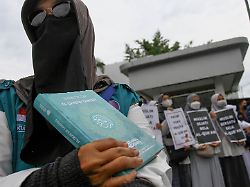Increased risk of terrorism
Sweden’s police ban the burning of the Koran in front of the embassy
2/8/2023 8:53 p.m
Sweden has new enemies after right-wing extremist Rasmus Paludan burned a Koran. The provocation benefits not only Turkish President Erdogan, who is rejecting the Scandinavian country’s accession to NATO. Assassins are also threatening. The police take action.
In a rare move, Swedish police have banned a protest outside the Turkish embassy in Stockholm that was intended to burn a Koran. A similar action in January “intensified the threats against both Swedish society in general and against Sweden, Swedish interests abroad and Sweden abroad,” the police justified their denial of a demonstration permit.
Sweden has become a “higher priority target for attacks,” police said. Meanwhile, the Swedish secret service Sapo warned of the increased risk of a terrorist attack in Sweden.
The request for permission for the demonstration was made by the small and little-known Swedish organization Apallarkerna. The planned protest was directed against Sweden’s desire to join NATO. As in an action by the right-wing extremist provocateur Rasmus Paludan in January, a Koran was to be burned in front of the Turkish embassy in Stockholm.
Turkey demands measures against Kurds
Ankara has been blocking Sweden’s efforts to join NATO for months. The Turkish government is demanding that Stockholm take a harder line on Kurdish activists it considers “terrorists”.
In addition to Turkey, Hungary has yet to agree to NATO expansion. Like Finland, Sweden had applied for accession as a result of the Russian war of aggression against Ukraine – both countries thereby breaking with a long tradition of extensive military neutrality.
Paludan’s burning of the Koran sparked anti-Swedish protests in numerous Muslim countries. Negotiations between Sweden and Turkey on NATO accession have since been suspended.
